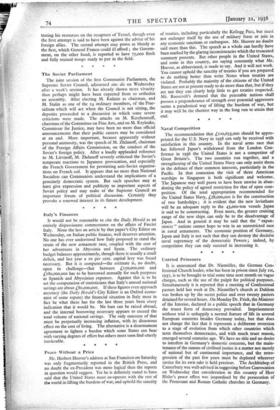Peace Without a Price Mr. Herbert Hoover's address at San
Francisco on Saturday was only fragmentarily reported in the British Press, and no doubt the ex-President was more logical than the reports in question would suggest. Yet he is definitely stated to have said that the United States must co-operate with the rest of the world in lifting the burdens of war, and uphold the sanctity of treaties, including particularly the Kellogg Pact, but must not endanger itself by the use of military force or join in any economic sanctions or embargoes. Mr. Hoover no doubt said more than this. The speech as a whole can hardly have been marked by the glaring inconsistencies which the truncated summary presents. But other people in the United States, and some in this country, are saying constantly what Mr. Hoover, as abbreviated, is made to say. And it will not work. You cannot uphold the sanctity of treaties if you are prepared to do nothing better than write Notes when treaties are violated. Probably the majority of the citizens of the United States are not at present ready to do more than that, but if they are not they can clearly help little to get treaties respected. Mr. Roosevelt's demand that the peaceable nations shall possess a preponderance of strength over potential aggressors seems a paradoxical way of lifting the burdens of war, but it may well be the shortest way in the long run to attain that end.














































 Previous page
Previous page